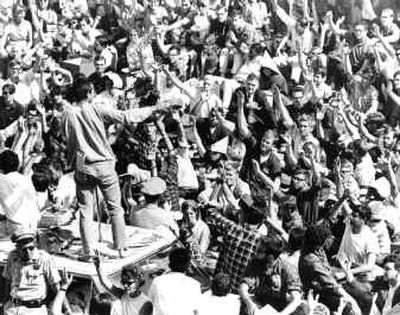Cal-Berkeley recalls free speech protest

BERKELEY, Calif. – Forty years ago, Free Speech Movement protesters at the University of California, Berkeley, were hauled off in handcuffs. On Friday, they were welcomed back with open arms.
A rally featuring former Democratic presidential hopeful Howard Dean was the highlight of a week of events that included lectures and teach-ins commemorating the 1964 protest.
A common theme of the events: Get involved.
“Activism is not dead. Power to the people is not dead,” said Dean, who spoke to a crowd of about 3,000 gathered under a blazing blue sky.
The Free Speech Movement began in October 1964 when police arrested graduate student Jack Weinberg for handing out leaflets about civil rights in violation of a campus ban on political activities.
It’s hard to imagine that rule today. Sproul Plaza, where Weinberg was arrested, is the site of campaigns promoting everything from opinions on the Middle East to the merits of affirmative action.
Back in 1964, police put Weinberg in a squad car, but couldn’t go anywhere because thousands of students surrounded the vehicle in a 32-hour protest.
Several students scrambled up on the car to speak, after considerately removing their shoes. Among the speakers was the late Mario Savio, who electrified the crowd with his call to “put your bodies on the gears … upon all the apparatus” and change the system.
This time around, police loaned a squad car to the erstwhile protesters to add authenticity to Friday’s rally.
“We were surprised that they were so readily amenable to it,” says Michael Rossman, one of the leaders of the movement and an organizer of the 40th anniversary commemoration.
Friday’s rally began with muted sing-alongs to protest-movement standards. But it wasn’t long before speakers energized the crowd with full-throated orations on the constitutionality of the Patriot Act, the Bush administration – and apathy.
“They depend on cynicism to keep you out of the battle,” thundered state Assemblywoman Jackie Goldberg of Los Angeles and a former Free Speech Movement leader. “Are you going to keep out of the battle?”
“No!” roared the crowd.
Dean told students merely voting is not enough. They should run for office or support someone else’s campaign.
“You have the power to stand up as they did in this very spot 40 years ago for a democratic America which allows ordinary people to reclaim their government,” he said. “You have the power. Use it.”
The Free Speech Movement culminated on Dec. 2, 1964, when 1,000 students marched into Sproul Hall for a sit-in and nearly 800 were arrested. Shortly after that, faculty voted to drop speech restrictions.
But the movement stretched beyond that, becoming a catalyst for the anti-Vietnam War protests that followed.